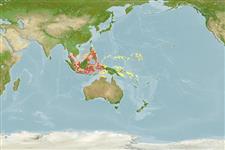>
Gobiiformes (Gobies) >
Gobiidae (Gobies) > Gobiinae
Etymology: Grallenia: Named for Gerald R. Allen, (G+R+Allen+suffix '-ia'), in honor of his great contribution to our knowledge of the diversity of coral-reef fishes.; lipi: Named for the Lembaga Ilmu Pengetahuan Indonesia (or Indonesian Institute of Science), abbreviation of the institute..
Environment: milieu / climate zone / depth range / distribution range
Sinh thái học
Biển gần đáy; Mức độ sâu 8 - 20 m (Ref. 90102). Tropical
Western Pacific: Indonesia.
Bộ gần gũi / Khối lượng (Trọng lượng) / Age
Maturity: Lm ? range ? - ? cm
Max length : 1.6 cm SL con đực/không giới tính; (Ref. 75132); 1.9 cm SL (female)
Short description
Khóa để định loại | Hình thái học | Sinh trắc học
Các tia vây lưng cứng (tổng cộng) : 7 - 8; Các vây lưng mềm (tổng cộng) : 9 - 10; Tia cứng vây hậu môn: 1; Tia mềm vây hậu môn: 9. This species is distinguished by the following characters: second dorsal-fin rays I, 9-10; anal-fin rays I, 9; vertebrae 10+17-18= 27-28, usually 10+18=28); first spine of first dorsal-fin greatly elongated or filamentous in males; second dorsal fin usually reaching to, or beyond, caudal-fin base when adpressed in adult, length of longest ray 17.5-21.8% of SL; length of longest ray of anal fin 12.6-18.1% of SL); scales on body restricted on posterior half of body, except for isolated patch of scales just behind pectoral-fin base; no pelvic frenum; length of pectoral fin 23.2-30.6% of SL); caudal-peduncle length 20.3-23.6% of SL; cephalic sensory canals and associated pores absent; an orange line present at the middle of dorsal fin in life (Ref. 75132).
Collected around an isolated, relatively large coral patch on flat, clean and fine sandy bottom
at a depth of 15 m; the area is typical for other sandy-bottom dwellers (e.g., Fusigobius inframaculatus, Limnichthys nitidus). Similar to its congener G. arenicola, as observed, this species did not display symbiotic association with any other organisms. Found to be widespread in Indonesia, and often found on light coloured sand or rubble to
about 15 m depth (Ref. 75132).
Life cycle and mating behavior
Maturities | Sự tái sinh sản | Spawnings | Egg(s) | Fecundities | Ấu trùng
Shibukawa, K. and A. Iwata, 2007. Grallenia, a new goby genus from the western Pacific, with descriptions of two new species (Perciformes: Gobiidae: Gobiinae). Bull. Natl. Mus. Nat. Sci., Ser. A, Suppl. 1:123-136. (Ref. 75132)
IUCN Red List Status (Ref. 130435)
Threat to humans
Harmless
Human uses
Các công cụ
Special reports
Download XML
Các nguồn internet
Estimates based on models
Preferred temperature (Ref.
123201): 28.5 - 29.2, mean 28.8 °C (based on 284 cells).
Phylogenetic diversity index (Ref.
82804): PD
50 = 0.5039 [Uniqueness, from 0.5 = low to 2.0 = high].
Bayesian length-weight: a=0.00708 (0.00333 - 0.01504), b=3.09 (2.92 - 3.26), in cm total length, based on LWR estimates for this (Sub)family-body shape (Ref.
93245).
Mức dinh dưỡng (Ref.
69278): 3.0 ±0.3 se; based on size and trophs of closest relatives
Thích nghi nhanh (Ref.
120179): Chiêù cao, thời gian nhân đôi của chủng quần tối thiểu là dưới 15 tháng (Preliminary K or Fecundity.).
Fishing Vulnerability (Ref.
59153): Low vulnerability (10 of 100).
